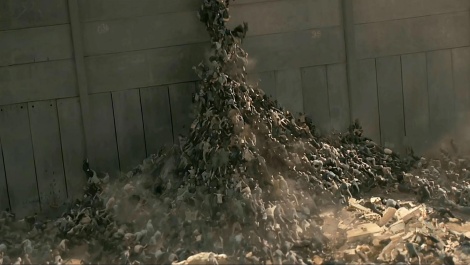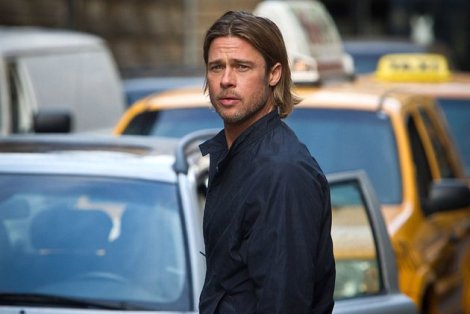Ten minutes into World War Z, when the explosions start, my mom leaned over and asked me, “Who are the bad guys in this movie?” She, obviously, has not read World War Z. I’m not even sure she saw previews for it, but three or four times throughout the movie, she made sure to tell me, “This movie is awesome!” and “This movie is so good!” I think this sentiment matches up with the general consensus – as a summer blockbuster, World War Z isn’t a bad movie, but it isn’t World War Z.
Spoilers for both the movie and book follow.
I loved World War Z the book. Loved, loved, loved, loved, loved beyond loved, went back and re-read the book multiple times loved the novel, but I failed to see how it could translate into a workable movie and when I sat in that theater, all of my fears were realized. There were no lobos, no quislings, no Paul Redeker, none of the vignettes I had loved in the book. There was no Battle of Freaking Yonkers, arguably the most well-known passage from the book. I thought there was a thirty second glimpse of it at the end, but the building top fire squad was definitely not a battle, so it better not have been a nod to Yonkers.

The book focused on the larger picture and benefited from the Narrator largely being absent. The movie had me rolling my eyes as Brad Pitt played the reluctant hero who would inevitably save the day while whining about his family – as if he were the only one with family left in the world. I almost cheered as the WHO worker told him he’d lost his family, his son to his zombified wife, and took his whining down a notch. There were also times in the movie when Gerry Lane, Brad Pitt’s character, was frustratingly quiet about information he knew or had. Why did he not immediately tell the people in Jerusalem they needed to be quiet? And when he was restrained at the WHO office, why not say he was a UN Inspector – the hilariously vague title given to him in the movie-verse – before urging them to call the satellite phone?
Following in the footsteps of 28 Days Later, the zombies were unnaturally fast and strong. Individually featured zombies were surprisingly understated with very little gore, but the CGI lemming-like hoards were cringe-worthy. There were a few jumps here and there, but for the most part, I just wanted the CGI to go away. It was a story of the direct aftermath of the zombie outbreak, rather than the removed re-telling of events as happened in the book. Reading up on the movie, it seems that it may be a planned trilogy – so perhaps the (UGH DO I HAVE TO ACKNOWLEDGE THE POTENTIAL OF IT?) sequel will time skip to where the book started.

The movie really only focused on four places, while the book spanned the globe and looked at everyone around the globe, from the top political players to the lowly college students who fought through the Battle of the Five Colleges. America is shown mostly devastated. South Korea is shown to have a working American military base. It’s also where we learn in the briefest and vaguest explanation possible for the outbreak. A locked up CIA agent ruins the North Korea story for us – apparently, everyone’s teeth were pulled to save people from being infected. In the book, everyone in North Korea vanishes and no one knows what happened to them. It’s eerie and ominous in the book; it’s a throw-away shocker in the movie.
As soon as Jerusalem was shown in the movie, I knew it would get a political spin. The book had some of the same political commentary, but it was better explained and stressed that Israel was working to include Palestinians into their safe zone. In the movie, it’s just a panicked massacre. Then it’s on to Moscow – kind of. The plane goes down and Brad Pitt and Segen, the Israeli Defense Forces soldier that he picked up in Jerusalem, end up walking who knows how far to get to the World Health Organization building in Cardiff. This is where the movie shifts from action movie to psychological thriller. The third act was reshot and, after researching how it could have ended, I have to begrudgingly admit it was a good idea – better to have a few fans (those who did not read the book) than to piss everyone off with too bleak of an ending.

However, the alternate ending might have cleared up the distraction that was Matthew Fox in all two of his scenes with all one of his lines. If you’re approaching World War Z not as World War Z, but as Contagion 2 (or Alternate Reality Contagion), it ramps up a few notches on the scale of decent movies. But the fact is, they called it World War Z and it has nothing to do with the actual stories contained in the novel World War Z.
Good on Max Brooks for distancing himself from this one.
Now let’s all join hands and pray that one day HBO will pick up the rights for a mini-series.
Give us that much, Brad. We’re begging you.
See, this is when you turn to the camera and in your best imitation of Paul Redeker from-the-audio-book voice, “There was no way to save everyone.”